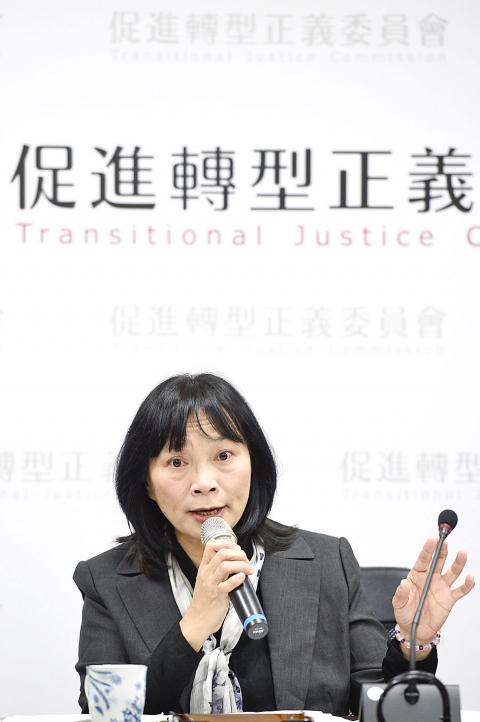Transitional Justice Commission Acting Chairwoman Yang Tsui (楊翠) yesterday said that the commission is shifting its attention to declassifying documents and dealing with authoritarian symbols.
Yang made the remarks during a radio interview, when the host asked her to comment on the commission’s next order of business following the one-year anniversary of its founding on May 31 last year.
The commission is to step up its efforts to collect records and documents from archives and depositories over the next year, with an eye toward increasing the volume of documents available, while it plans to start dealing with authoritarian symbols this month, she said.

Photo: George Tsorng, Taipei Times
When asked to identify the commission’s main challenges, Yang said that the bureaucratic instinct toward secrecy remains a difficulty during historical reconstruction and declassification efforts.
To exonerate victims of political persecution, the commission must first investigate the historical facts surrounding their cases, but the materials it has obtained from government agencies have often been redacted to the point of illegibility, she said.
The commission frequently has to negotiate with governmental agencies for access to documents in a less-censored form, she said.
An important contributing factor to these difficulties is the belatedness of the nation’s transitional justice program, she said, adding that resistance to transparency in many cases is rooted in institutional habit, not ill-intent.
“I believe transitional justice is a work of advocacy of which communication is a part,” she said, adding that the commission is overseeing its sixth large-scale transfer of documents of about 130,000 items.
Asked to name an event of personal emotional resonance she experienced as a member of the commission over its first year, Yang said that she was moved when former Japanese Imperial Navy veteran Huang Chin-tao (黃金島) showed up in a wheelchair at the commission’s first-ever ceremony on Oct. 5 last year, held to exonerate victims of political persecution, despite him suffering an illness.
“I was very much moved when I saw the corner of Huang’s eye glisten and he shook with emotion as he went through the documents of exoneration during the ceremony,” she said.
As she is a descendent of novelist Yang Kui (楊逵), who was jailed for 12 years for political crimes, it was deeply gratifying to see Huang at the ceremony, Yang said.
Born in Taichung during the Japanese colonial era, Huang served as a volunteer soldier in the Imperial Japanese Navy.
After Japan’s defeat in World War II in 1945, he was detained in China’s Hainan Province before escaping and returning to Taiwan.
He headed an armed uprising against Chinese Nationalist Party (KMT) troops following the 228 Incident in 1947, an act for which he received a death sentence that was later commuted to life in prison.
He was released in 1975 after serving 24 years in prison.
Huang died in January aged 93.

Alain Robert, known as the "French Spider-Man," praised Alex Honnold as exceptionally well-prepared after the US climber completed a free solo ascent of Taipei 101 yesterday. Robert said Honnold's ascent of the 508m-tall skyscraper in just more than one-and-a-half hours without using safety ropes or equipment was a remarkable achievement. "This is my life," he said in an interview conducted in French, adding that he liked the feeling of being "on the edge of danger." The 63-year-old Frenchman climbed Taipei 101 using ropes in December 2004, taking about four hours to reach the top. On a one-to-10 scale of difficulty, Robert said Taipei 101

Nipah virus infection is to be officially listed as a category 5 notifiable infectious disease in Taiwan in March, while clinical treatment guidelines are being formulated, the Centers for Disease Control (CDC) said yesterday. With Nipah infections being reported in other countries and considering its relatively high fatality rate, the centers on Jan. 16 announced that it would be listed as a notifiable infectious disease to bolster the nation’s systematic early warning system and increase public awareness, the CDC said. Bangladesh reported four fatal cases last year in separate districts, with three linked to raw date palm sap consumption, CDC Epidemic Intelligence

Two Taiwanese prosecutors were questioned by Chinese security personnel at their hotel during a trip to China’s Henan Province this month, the Mainland Affairs Council (MAC) said yesterday. The officers had personal information on the prosecutors, including “when they were assigned to their posts, their work locations and job titles,” MAC Deputy Minister and spokesman Liang Wen-chieh (梁文傑) said. On top of asking about their agencies and positions, the officers also questioned the prosecutors about the Cross-Strait Joint Crime-Fighting and Judicial Mutual Assistance Agreement, a pact that serves as the framework for Taiwan-China cooperation on combating crime and providing judicial assistance, Liang

US climber Alex Honnold left Taiwan this morning a day after completing a free-solo ascent of Taipei 101, a feat that drew cheers from onlookers and gained widespread international attention. Honnold yesterday scaled the 101-story skyscraper without a rope or safety harness. The climb — the highest urban free-solo ascent ever attempted — took just more than 90 minutes and was streamed live on Netflix. It was covered by major international news outlets including CNN, the New York Times, the Guardian and the Wall Street Journal. As Honnold prepared to leave Taiwan today, he attracted a crowd when he and his wife, Sanni,